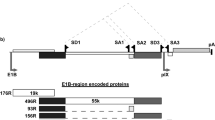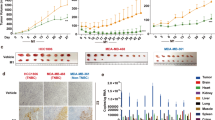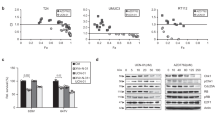Abstract
Our previous studies demonstrated that the promyelocytic leukemia gene, PML which involved in the 15;17 translocation in acute promyelocytic leukemia (APL) is a growth and transformation suppressor. In this study, recombinant PML adenovirus, Ad-PML was constructed and used to infect human breast cancer cells in vitro and in vivo, the anti-oncogenic function of PML and its mechanism of growth suppressing effect in breast cancer cells were examined. We showed that Ad-PML effectively infected the MCF-7 and SK-BR-3 cells. A high level of PML protein was expressed within 24 h post-infection and a detectable level remained at day 16. Ad-PML significantly suppressed the growth rate, clonogenicity, and tumorigenicity of breast cancer cells. Intratumoral injections of MCF-7-induced tumors by high titer Ad-PML suppressed tumor growth in nude mice by about 80%. The injection sites expressed high level of PML and associated with a massive apoptotic cell death. To elucidate the molecular mechanism of PML's growth suppressing function, we examined the effect of Ad-PML on cell cycle distribution in MCF-7 and SK-BR-3 cells. We found that Ad-PML infection caused a cell cycle arrest at the G1 phase. We further showed that G1 arrest of MCF-7 cells is associated with a significant decrease in cyclin D1 and CDK2. An increased expression of p53, p21 and cyclin E was found. The Rb protein became predominantly hypophosphorylated 48 h post-infection. These findings indicate that PML exerts its growth suppressing effects by modulating several key G1 regulatory proteins. Our study provides important insight into the mechanism of tumor suppressing function of PML and suggests a potential application of Ad-PML in human cancer gene therapy.
This is a preview of subscription content, access via your institution
Access options
Subscribe to this journal
Receive 50 print issues and online access
$259.00 per year
only $5.18 per issue
Buy this article
- Purchase on Springer Link
- Instant access to full article PDF
Prices may be subject to local taxes which are calculated during checkout
Similar content being viewed by others
Author information
Authors and Affiliations
Rights and permissions
About this article
Cite this article
Le, XF., Vallian, S., Mu, ZM. et al. Recombinant PML adenovirus suppresses growth and tumorigenicity of human breast cancer cells by inducing G1 cell cycle arrest and apoptosis. Oncogene 16, 1839–1849 (1998). https://doi.org/10.1038/sj.onc.1201705
Received:
Revised:
Accepted:
Published:
Issue Date:
DOI: https://doi.org/10.1038/sj.onc.1201705
Keywords
This article is cited by
-
TRIMming p53’s anticancer activity
Oncogene (2016)
-
ATP directed agent, 8-chloro-adenosine, induces AMP activated protein kinase activity, leading to autophagic cell death in breast cancer cells
Journal of Hematology & Oncology (2014)
-
PML contributes to p53-independent p21 up-regulation in gamma-irradiation induced DNA damage responses
Chinese Science Bulletin (2011)
-
The Role of PML in the Nervous System
Molecular Neurobiology (2011)
-
Stemming out of a new PML era?
Cell Death & Differentiation (2009)



